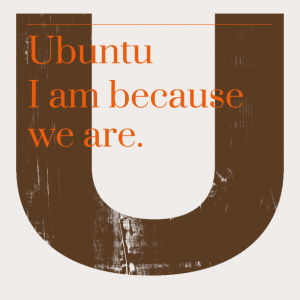There is a word in South Africa — Ubuntu — a word that captures Mandela’s greatest gift: his recognition that we are all bound together in ways that are invisible to the eye; that there is a oneness to humanity; that we achieve ourselves by sharing ourselves with others, and caring for those around us.
President Barack Obama
during Nelson Mandela’s Memorial Service
Have you heard of Ubuntu? I believe it is a perfect one word description of the concept of impact mindfulness. So, if you haven’t heard of it, I encourage you to read on and learn with me what this interesting word really means.
Admittedly, until I listened to Barack Obama’s speech at the memorial service for Mandela last week, I had never heard of Ubuntu. Since then I have learned that it is a word in the Nguni Bantu language, a philosophy and also the name of a Linux-based operating system.
Mandela would certainly be very familiar with the term. After all he was born into the Thembu tribe of the Xhosa ethnic group. The Xhosa are part of the South African Nguni migration which slowly moved from the region around the African Great Lakes into South Africa some 2,000 years ago. Therefore, the term is buried deep within Mandela’s ethnic heritage.
Mandela was once interviewed (see video embed below) and asked about Ubuntu. I especially like what he said in the following quote…
Ubuntu does not believe that people should not address themselves. The question therefore is, are you going to do so in order to enable the community around you to improve. These are the important things in life. And if one can do that, then that is something very important and to be appreciated.
I also remember hearing someone say (may also have been in Obama’s speech?) something to the effect that rather than the Western philosophical idea of Descartes, cogito ergo sum, or “I think therefore I am”, Ubuntu declares, “I am because we are.”
In other words, the individual draws his or her own unique expression of humanity from the very existence of the community to which he or she belongs.
It would seem, therefore, that Ubuntu is a one-word description of a philosophy that embraces collectivism, but does not do so at the expense of individualism, as long as individualistic action is beneficial to society at large.
And it seems to have been the philosophy that served as a driving force behind Mandela’s selfless action. Actions that freed the South African black community from the oppression of Apartheid, but also united the South African community as a whole, both black and white, together with all the other “colors” that made up the “Rainbow Nation.”
You see, Mandela didn’t have to do it that way, but he did…and maybe Ubuntu was the selfless idea that caused the angry man that entered Pollsmoor to emerge almost three decades later as one of history’s greatest reconciliators.
Tim Jackson, who is a British ecological economist and professor of sustainable development at the University of Surrey and author of the book, Prosperity Without Growth, refers to Ubuntu as a philosophy that supports the changes that are necessary to create a future that is economically and environmentally sustainable.
And during the hate speech trial of the former President of the ANC Youth League, Julius Malema, Judge Colin Lamont expanded on the definition in his judgment of guilt by writing that…
Ubuntu is a concept which:
- is to be contrasted with vengeance;
- dictates that a high value be placed on the life of a human being;
- is inextricably linked to the values of, and which places a high premium on, dignity, compassion, humaneness and respect for the humanity of another;
- dictates a shift from confrontation to mediation and conciliation;
- dictates good attitudes and shared concern;
- favors the re-establishment of harmony in the relationship between parties and that such harmony should restore the dignity of the plaintiff without ruining the defendant;
- favors restorative rather than retributive justice;
- operates in a direction favoring reconciliation rather than estrangement of disputants;
- works towards sensitizing a disputant or a defendant in litigation to the hurtful impact of his actions to the other party and towards changing such conduct rather than merely punishing the disputant;
- promotes mutual understanding rather than punishment;
- favors face-to-face encounters of disputants with a view to facilitating differences being resolved rather than conflict and victory for the most powerful;
- favors civility and civilized dialogue premised on mutual tolerance.
Summing up the above in a way that is relevant to this blog, Ubuntu seems to be a philosophy that declares…
- one should prioritize actions for sustaining the community (or utility, i.e., the greater good) over self-interest…
- we are indeed all in this boat together and our actions should recognize and support that fact (The Big Us)…
- and individualistic (or ego-driven) notions to the contrary should be discarded (removing Impact Blinders).
Therefore, it is a word, as well as a way of thinking, that you’ll be reading about more here in the future.
